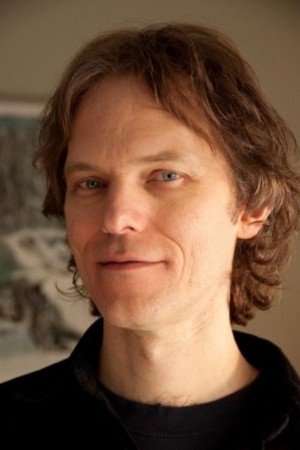Adrian Ivakhiv, a professor at the University of Vermont, came to the Newtown Campus Tuesday April 17 to give a speech in the Gateway Auditorium. The title of Adrian’s speech was “Are we all Avatars Now? Living in the age of the World Motion Picture.”
Adrian describes the World Motion Picture, or Empire of the Eye, as “something more complicated than a movie.” Where a movie is a predetermined perspective of a controlled scene, the World Motion Picture is infinite and ever changing perspectives of the motion picture called the world.
His speech focused on how technology has affected our perspective of the world. “Technology has given us an objective picture of the universe.” His main focus, however, was visual and televisual technology which Adrian says “is at the core of information sharing.” He describes the role of images in human history “humans have always told stories and used visual representation to help portray them.”
But Adrian argued the “rapid advancement of technologies has caused humans to view the world and universe objectively as an outsider.” He continued to say “Humanity has become separate from the world.” We just watch it go by, “brought on,” according to Professor Ivakhiv, “by the use of fossil fuels,” speeding up human lives and this disengaging them from their surroundings.
At this point in the speech, Adrian introduced James Cameron’s epic blockbuster “Avatar,” the most watched film worldwide. Adrian equated the humans mining for “unobtainium” on the planet Pandora to us on Earth not connected to the beauty of the world surrounding them, unlike the Na’vi.
Professor Ivakhiv described the vastly successful film as “Pocahontas meets Bambi and a high tech Dances with wolves.” “Avatar” is filled with many allegories which Adrian outlined including the destruction of “Home tree” to the attacks of September 11, and the quest for the rare mineral as “the military-industrial-complex” exploiting the lands of the native people.
Many people saw their own message in the film and as Professor Ivakhiv described, the film “set in motion emotional currents throughout the world.” He continued the “film lead to global activism and a change in human perspective in the world.”
An “Avatar” is “the body or character a person takes on to accomplish something and then returned physically unchanged.” This is the Na’vi body the main character consciously possess to accomplish their mission. Adrian argues that humans today, through the avatars of mass media such as the internet and television. “The camera allows the ‘seer’ to remain hidden, something never possible before.”
Professor Adrian Ivakhiv’s lecture on “Avatar” and its effect on society were very interesting; despite some minor technological difficulties it was a smooth and interesting talk.
“Are we all avatars?”


